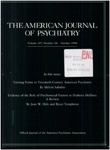Clorazepate and lorazepam: clinical improvement and rebound anxiety
Abstract
Sixty-two anxious patients were treated under double-blind conditions for 4 weeks with either clorazepate or lorazepam. Two-thirds of each treatment group were then switched abruptly to placebo for 2 weeks, while one-third continued to receive active medication. Two major findings were obtained. About 70% of the patients maintained improvement during the 2-week placebo period. Some patients, however, experienced rebound anxiety, which appeared to be more intense and occurred earlier when placebo was substituted for a benzodiazepine with a short half-life (lorazepam) than for one with a long half-life (clorazepate). The clinical relevance of these findings is discussed.
Access content
To read the fulltext, please use one of the options below to sign in or purchase access.- Personal login
- Institutional Login
- Sign in via OpenAthens
- Register for access
-
Please login/register if you wish to pair your device and check access availability.
Not a subscriber?
PsychiatryOnline subscription options offer access to the DSM-5 library, books, journals, CME, and patient resources. This all-in-one virtual library provides psychiatrists and mental health professionals with key resources for diagnosis, treatment, research, and professional development.
Need more help? PsychiatryOnline Customer Service may be reached by emailing [email protected] or by calling 800-368-5777 (in the U.S.) or 703-907-7322 (outside the U.S.).



